Your puppy moves in
The time has finally come: you're about to welcome a puppy to your home! This is the start of an exciting time for you and your four-legged friend. For your puppy, the move means saying goodbye to their mother and siblings as well as their breeder; their most important contacts so far. They are scared and unsettled, surrounded by an unfamiliar environment with new smells and sounds. Now you are responsible for this little ball of fluff. It's up to you to acclimatise them to their new "pack", and it has to be done carefully.
Give your puppy plenty of rest during this challenging introductory period and gradually get them used to their new surroundings!
Taking them home
When you bring your new family member into your home, it is a good idea to bring back some things - and therefore odours - from your pet's old home that are familiar to them, such as their blanket, a toy and their usual food. Please do not transport your dog unrestrained in the car, but in a special dog crate. Your dog should not be fed immediately before setting off, as puppies can quickly become nauseous on their first car journey. In the worst case scenario, this can lead to the animal permanently associating a negative experience with driving. Give the puppy the opportunity to relieve itself after the first car journey or during a longer journey (e.g. in the garden).
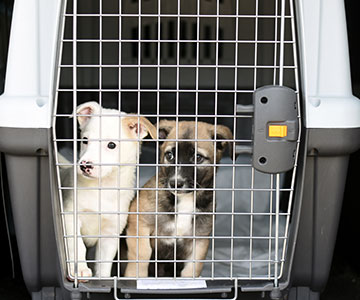
Puppy-proof home
Ideally, you will have already puppy-proofed your home – otherwise now would be a good time if you haven't already done so. For example, make sure that any cables are arranged so that the puppy cannot chew on them. You may also want to fit barriers on stairs. It might also make sense to move fragile items temporarily or to remove a valuable carpet for the time being. And make sure that the puppy does not eat any human food. They should only be fed a high-quality puppy food.
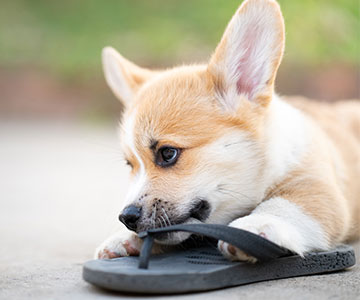
The first few days in their new home
Give your puppy enough time to settle in. In their new home, your new housemate will be exposed to a lot of new impressions, so they will need a few days to get used to their new surroundings. Moving to a new home is stressful for a dog: they are suddenly separated from their mum and siblings and have to get used to new smells and new people in an unfamiliar environment.
For this reason, you should also avoid having visitors over in the first few days. Naturally, everyone wants to get to know their friend's new companion, but too many strangers can make the first few days even more unsettled and your puppy can quickly become overwhelmed. On top of this, your puppy has to deal with a completely new bacterial flora in its new environment, which their immune system has to get to grips with first. Stress actually has a negative effect on the immune system, which is why quite a few puppies get a little ill during their first few days in their new home.
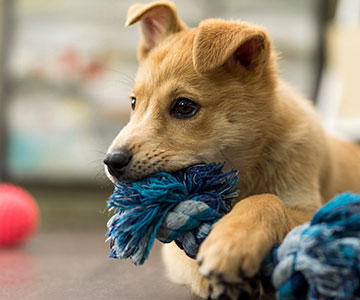
Tips for getting your puppy settled in
- Collect your puppy at the weekend or after booking some time off. They will be homesick in their new surroundings and will need lots of love and attention from you.
- At the same time, give them space to themselves, let them have their rest periods and don't disturb them when they are sleeping or eating.
- Their basket is a place where they can retreat and feel at ease. Choose a place where the puppy can hide away and have some peace and quiet, but at the same time keep an eye on family activities. This is because they'll want to be part of the pack and not be left on their own totally.
- Show the puppy their basket on arrival and give them plenty of time to explore their new surroundings. The water bowl and food bowl should be in a place where the puppy is not likely to be disturbed.
- Playing is the best medicine for salving the pain of separation. Distract them and at the same time encourage their playful instinct and curiosity. Playing will keep them busy and at the same time strengthen the bond and trust between the puppy and you as their carer.
Finding a good name for your puppy
Finding the right name for your new family member, unless you have a ready-named puppy from the breeder, is a decision that has to come from the heart and is never easy. This should be personal, creative and, ideally, suitable for the new, as yet unknown puppy. At the same time, everyone in your family pack should like the name.
To get the puppy used to its new name, reward it by stroking it or talking to it lovingly when it responds to your call. The puppy will then associate their name with positive connotations.
Other pack members – pets and children in the home
Encounters with other animals sharing the home should be approached with care, patience, and time. Cats in particular need a place to retreat to. It is a good idea to put a partition on a door so that the cat can get to safety, away from the boisterous puppy.
When introducing another older dog, put both animals on a lead first so that they can sniff each other thoroughly at their own pace. It may take some time before the new housemate is accepted. So do not leave the two four-legged friends unsupervised until you are sure that they've reached an understanding of each other.
Older dogs are not always well-disposed towards puppies – the much-vaunted idea that all dogs instinctively protect puppies is and remains a fairy tale.
If your children are old enough, you can get them to help you with training and looking after the puppy. Children are usually enthusiastic about dogs and like to get involved. However, small children in particular need to understand that this is a sensitive creature – and not a cuddly toy – that needs a lot of care and, above all, rest. Explain to them that they should treat this little dog with love and not pull its tail or ears. Hasty movements should also be avoided so that the dog doesn't bite out of fear. In cases like this, it's better to be safe than sorry: do not leave children alone with the puppy, especially at the beginning.
If there are babies in the house, you should be particularly careful at first. The puppy should first smell the baby's clothes and only gradually be allowed to approach the baby under careful supervision.
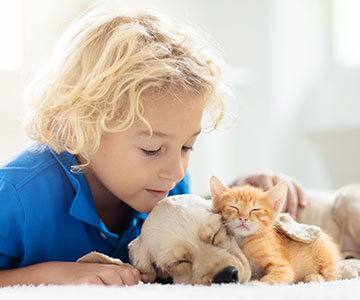
How you can help your puppy acclimatise
Your puppy will miss the closeness of their old pack, especially during the first few nights. If they howl, you can put an alarm clock in their basket. The ticking should remind them of their mum's heartbeat. Together with the blanket that smells of their mum's scent, they should then feel safe and secure. You can also put a cuddly toy in their basket as a little comforter. Your new dog needs lots of cuddles, and they need to be close to you.
Take care that they don't strenuously exert themselves or climb stairs, for example. Their bones and joints, which are still soft, undergo a lot of strain otherwise.
Important: Always give your four-legged friend a break so that they can rest! Puppies are always exuberant and want to play and run around, but they need rest periods in between – just like children.
Dogs do not like being alone, and they always like to have their pack within reach. However, your puppy does not have to accompany you everywhere. Think about which rooms or areas they're allowed in and which they mustn't go in. If necessary, make it clear to them from the start that you don't want them in the bedroom, in bed or on the sofa.
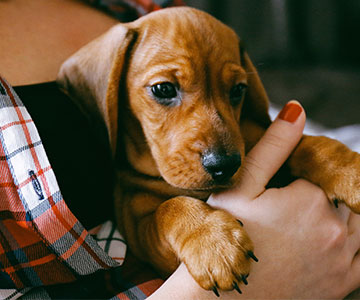
Product recommendation
The benefits of PLATINUM dog food
- PLATINUM uses a unique preparation method called FSG, which offers numerous advantages compared to conventional dog food.
- Dog food prepared with FSG is gently cooked only in its own meat juice and is therefore nutrient-rich like BARF, excellent for building muscles and also extra tasty for your dog.
- With at least 70% fresh meat in the dry dog food and 83% fresh meat or fresh fish in the wet dog food, PLATINUM places great value on a composition of the food that is adapted to the needs of dogs.
- The declaration and composition of dog food prepared with FSG is tested regularly and independently by ELAB Analytik GmbH (formerly TÜV SÜD ELAB) — for canine health protection.
- PLATINUM is generally very well accepted by dogs of all breeds and ages. Even four-legged friends with sensitive digestion or intolerances usually tolerate PLATINUM dog food well.
- All products are free of soya, GMOs and gluten. In addition, no flavour enhancers, attractants, odourants or colourings are used.
- Over 100,000 positive customer reviews at Trusted Shops speak for themselves!


 Deutsch
Deutsch
 English
English
 Nederlands
Nederlands
 Français
Français

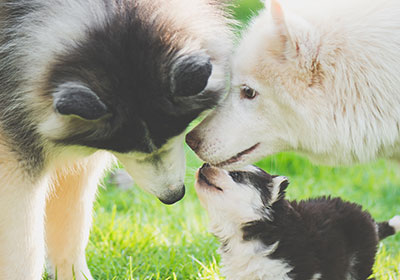
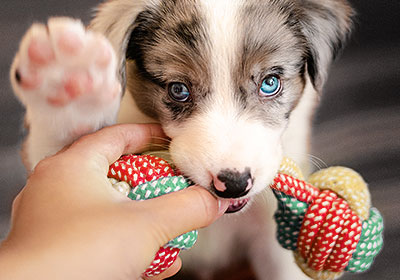
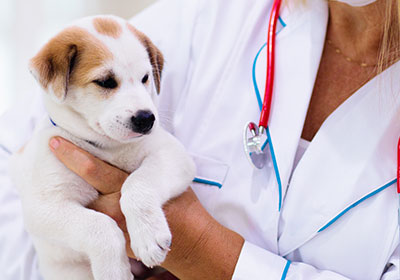
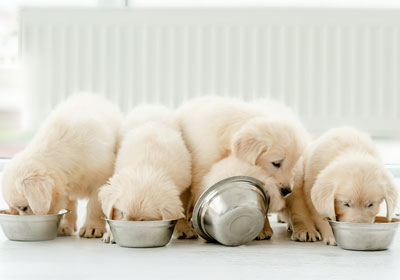
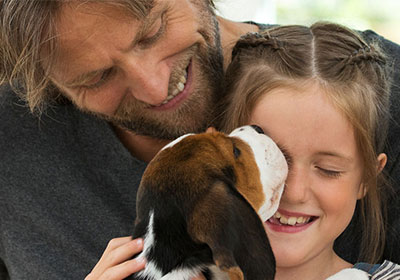
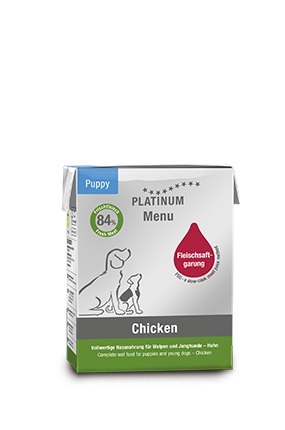
.png)